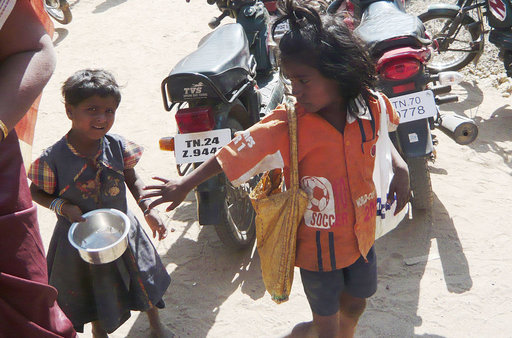(About the Author: Sohini Rangarajan Paul studies in Class VIII at Chirec Public School, Hyderabad)
The signal flashes red, the throng of cars comes to a halt and it is at this moment I first see her. A little girl holding a rusted bowl with a few coins in it. She is close to my age but we look nothing alike. Her hair is brown from being malnourished. Mine, black due to diligent oiling. Her clothes are tattered and mine are the latest trends. She walks towards the car next to my own. She holds out her bowl and knocks on the window.

I see the stark difference in our lives. Hers, one where she might not have her next meal and mine, one where we were dining out. I see the man in the car look displeased at the sight of the girl. I can hear him vaguely. He shoos the girl away saying that he doesn’t have change. That I know is untrue seeing his bulging wallet on the dashboard in front of him. The girl too knows the truth, and her face fills with desperation as she walks away.
As the scene unfolds, I try to understand why the man did what he did. He could have decided not to give the money because he thought the child was like the other beggars whose stories are circulated on WhatsApp, ones who were said to have lakhs of rupees but just begged for easy cash. Maybe he thought that giving the girl money would be unhelpful, that money was of no value to him, and he assumed the same for her. He could have also thought that the girl was from a cartel and was coerced into begging, therefore not wanting to contribute to that nasty cycle.
When I see a child in need of some food and water, I try to contribute. Even a few coins could help her. I find it difficult to second-guess her motives. If someone is able to lower their self-respect and resort to begging, I assume that they are in dire need. I, for one, would still give the money because I would not risk the slightest chance.
When my father was young, a labourer once came knocking at their door. He was asking for some money. He had pawned of his wife’s jewellery to come into some money. He had defaulted on a payment and the pawnbrokers were after him. He was asking for 30 rupees, a sizeable sum in those days. But he was turned away by my grandfather who assumed that the story was false.
My father, after a few minutes, wondered if the man had been genuine. And at the thought, he decided to make a compromise. He told my grandfather that they should give the man 15 rupees, in the case that he was, in fact, telling the truth. Both of them searched through all the neighbouring streets and scoured the roads but the man was nowhere in sight. In the end, the man didn’t receive the money. My father has always held a measure of guilt due to this incident.
It is never truly possible to understand the motives of these child beggars. The money that we give away is of no great value that it will pinch our pockets. But it will bring some weight to theirs. The money could feed them a meal. And knowing this possibility makes it easier to give. There are over 8 lakh children who are on the street. Majority of them are runaways because of family conflict, alcoholism, abuse, drugs and the overall feeling of being unsafe. If these children find it safer to live on the street than in their own homes, then a small act of kindness can at least make their lives a bit more bearable.

